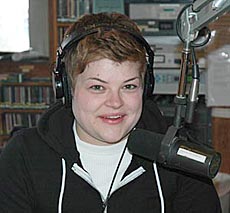Briana O'Higgins is a public radio junkie.
"I have been known to leave the radio on 24 hours a day," O'Higgins admitted with a smile. "I don't listen to Top 40, obviously. But anything that has a live host somewhere, I'm cool."
As a first-year master's student in the Social Documentation program, O'Higgins is focusing on audio production. One of her documentaries was recently picked up by National Public Radio, which showcases new talent on its podcast site.
O'Higgins caught the radio bug as an undergraduate at Antioch College in Ohio, where she was an intern for the local NPR station. "I fell absolutely in love," she recalled. She stayed on at the station for nine months after graduation, then spent four months at the Salt Institute for Documentary Studies in Portland, Maine, where she became interested in radio as a vehicle for social change.
"I see radio as a way to bridge the gap between academia and activism," she said. In the Social Documentation program, O'Higgins has found a way "to take the ideas and concepts discussed in the academy and make art out of it." (To hear some of her work, visit The Public Radio Exchange; registration is required.)
Picked up by NPR, her documentary entitled "We Are the Canaries" explores the experiences of four women diagnosed with chronic fatigue immune-dysfunction syndrome. Her master's project will also focus on chronic illness. O'Higgins, who suffers from lupus, says illuminating the nonmedical aspects of illness can shed light on social norms and expectations, and the way society devalues the ill.
"Since I was young, lupus was always very medical, but there was always something else different about me because I was sick," she said. "Illness and disability is a way to look at gender roles, productivity, cultural norms. Illness has been medicalized. If you live long enough, everyone has a disability."
As a vehicle for information, radio is an inherently empowering medium, she noted. "Ultimately, for me, the goal of a radio piece is to have listeners experience a moment when they see themselves and realize they could think about things differently," she said, expressing a desire to produce "little stories that illustrate wider social problems."
The master's program in Social Documentation offers students a "theoretical grounding" in social science research and training in audio, video, film, photography, and new media to produce work that will contribute to social change. O'Higgins says radio is her way to contribute to a better world. "I was never on the bus to D.C.," she says, referring to political protests. Rather, she says, "Social change is incremental through cultural production."
Captivated by the work of radio visionaries like This American Life creator Ira Glass, O'Higgins began producing radio documentaries, including a recent piece about an old-time, midway-style animal freak show in Venice Beach and a profile that aired on Maine Public Radio of a loner whose consolations in life--collecting Fiestaware and listening to Barbra Steisand records--strike an emotional chord with listeners.
Lately, as a substitute host for KUSP Radio, the NPR affiliate in Santa Cruz, O'Higgins has found herself drawn to the role of on-air host, as well.
"You know how people say, when they hear a recording of their voice, 'I don't sound like that, do I?' Well, that happened to me, too. The first time I was invited to do a voiceover promotional piece, I think I probably recorded it 500,000 times," she said. "Then I got over it and was hooked."
O'Higgins is heartened by the growth of public radio in recent years, and although her twin sister isn't yet a fan, Briana looks forward to a career in broadcasting. "I loved the Midwest," she said, hinting at her likely destination after graduation. "I love Chicago Public Radio."



